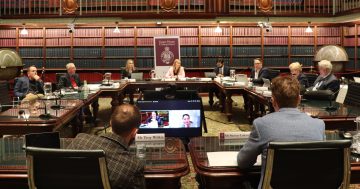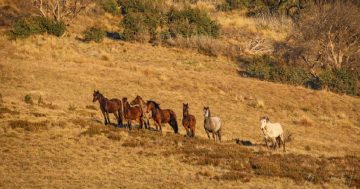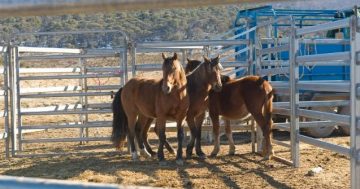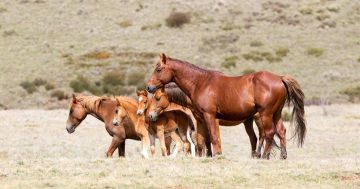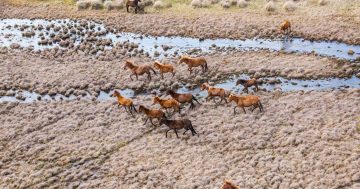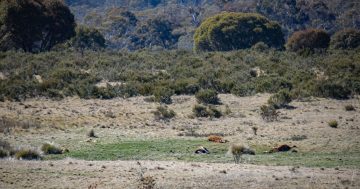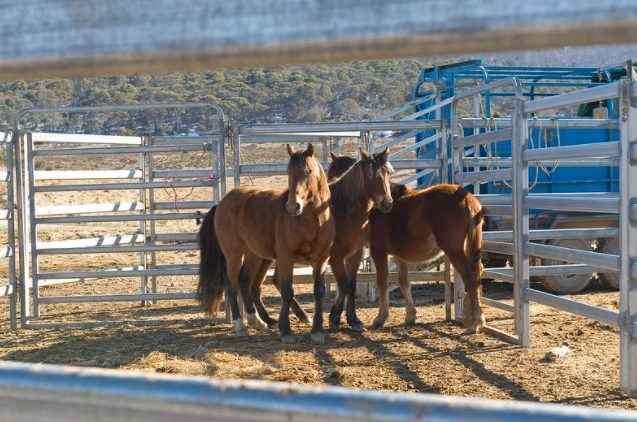
There’s been a suspension to the rehoming of Kosciuszko National Park’s wild horses pending an investigation of the NSW National Parks and Wildlife Service Wild Horses Rehoming Program. Photo: Supplied.
An investigation has been launched into the NSW National Parks and Wildlife Service (NPWS) Wild Horses Rehoming Program after various allegations were made public concerning its administration.
The move follows the discovery of 500 carcasses – alleged to have been illegally butchered horses – in a dry creek bed at a Wagga Wagga property on 17 April.
In a statement yesterday (26 April), the NSW Department of Climate Change, Energy, the Environment and Water (DCCEEW) said information provided to NSW Environment Minister Penny Sharpe by 2GB radio broadcaster Ray Hadley had prompted the investigation.
Mr Hadley has alleged the NPWS failed to comply with its rehoming guidelines when rehoming more than 250 wild horses to a person with links to an alleged illegal knackery in the Wagga area.
The minister has asked the DCCEEW secretary to investigate the administration of the NPWS wild horse rehoming program as a whole. An external professional services firm is being engaged to conduct the investigation and will start next week.
The rehoming of wild horses from Kosciuszko National Park (KNP) has been officially suspended while the investigation takes place.
The investigation details 14 terms of reference with a focus on both general questions, and questions specific to the Wagga case and a person of interest (POI).
The seven general questions will examine how the NPWS allocates horses to applicants under the program; current rehomer approval requirements; post-delivery and rehoming monitoring and the restrictions that apply to the wild horses and their use once received by rehomers.
Information and data sharing protocols existing across government rehoming and animal welfare regulation agencies, local government and other horse-related industry agencies (such as Racing NSW) are also to be investigated.
Any gaps that exist in the policies and procedures relating to the supply of wild horses generally will also be identified.
The alleged illegal knackery at Wagga faces further scrutiny with the investigation specifically looking into the circumstances around the supply of wild horses to the POI accused of running the operation.
It will also question the allocation of wild horses to the POI during the period of time in question and what protocols were followed; if there if there was any formal or informal follow-up or monitoring of the POI and if the NPWS made enquiries regarding the fitness of the applicant to rehome wild horses given the large number of wild horses requested by that applicant.
They will be probed about any additional checks or information they might have undertaken or received in relation to the POI at the time they were receiving rehomed horses.
A review of NPWS internal policies and procedures to identify matters and circumstances relating to the supply of wild horses to the POI will also be conducted.
And, finally, the last question in the investigation asks if any immediate lessons can be learnt from this situation and can improvements be made to the settings for the future.
The report is expected to be finalised by 14 June 2024.
Independent Wagga Wagga MP Joe McGirr, who led calls for a parliamentary inquiry, has welcomed the news but said it remained important all questions were answered.
“I’m pleased that the government has also announced an inquiry into the feral horse rehoming program and that an external firm will carry out this important work,” he said.
He said a whole-of-government inquiry, led by premier and cabinet, should work closely with all the relevant agencies including Wagga Wagga City Council to investigate what went on at that property.
Dr McGirr said the Terms of Reference for inquiry specifically related to the Wagga knackery broadly met his expectations but stressed that the community needed absolute confidence that the investigation would answer all critical questions.
“I’ve said from the start that this needs to be a detailed and transparent inquiry that establishes the entire picture of this operation, including how the horses were sourced, the circumstances in which they arrived at the knackery and who should be accountable for this distressing situation,” he said.
“It’s essential that our community receives full and frank answers to these questions and more …,” Dr McGirr said, “it’s also important we have confidence in the rehoming program so that it can continue to operate.”
Wagga council is expected to release the findings from its investigation next week.
The matter has led to a fourth hearing of the NSW senate inquiry into the proposed aerial shooting of brumbies in the Kosciuszko National Park, set down for 23 May.
Original Article published by Edwina Mason on About Regional.


